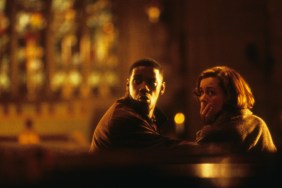
Anyone expecting or even comparing Nicolas Winding Refn‘s Only God Forgives to Drive needs to explore his catalog a little further. The closest comparison you can draw is to his 2009 feature Valhalla Rising, a slow-paced, ambiguous film with a focus on religion, transformation and a search for God.
In terms of pacing, religion, transformation and a penchant for executioner violence, Only God Forgives and Valhalla are very similar. Fans arriving at the film through the likes of Refn’s Pusher trilogy, Bronson or Drive will likely be disappointed to find it moves at a snail’s pace for the entirety of its running time with very little overt explanation for what’s going on, though the religious, Oedipal and sexual themes are hard to overlook.
After leaving the theater, my immediate reaction was to join the chorus calling it “style over substance” with style to spare. I began working out my thoughts with other critics, explaining my reaction and interpretation and hearing theirs. There was a difference of opinion in some respects with the religious themes. I felt it was a story of two angels, an angel of vengeance and an angel of mercy. Some believed my Angel of Vengeance was in fact an embodiment of God. By the end of the discussion I realized there was only one angel, if any…
To read Refn’s directorial statement he believes this “Angel of Vengeance” only believes himself to be God, and sees him as the film’s antagonist. So where does that leave us?
The story centers on Julian (Ryan Gosling), an American fugitive living in Bangkok where he runs a boxing club and sells drugs with his brother, Billy (Tom Burke). Billy, as it turns out, has something of an inner-demon, which we meet when he kills a 16-year-old girl and sits in the corner of the room, soaked with blood. He remains until the police arrive.
The police, led by Chang (Vithaya Pansringarm) — my Angel of Vengeance, embodiment of God, or whatever you want to call him — who arrives on scene and doles out punishment by calling the father of the young girl into the room and telling him, “Do what you want.” He does, pummeling Billy into a pulp, face smashed into a pancake, etc. But our God-like police officer isn’t done with papa yet and decides he too must be punished, but not for killing the man who killed his daughter, but for allowing his daughter to become a prostitute in the first place. You’ll recognize him later in the film as the man with half his right arm cut off with a sword.
Julian seeks out this man for his own revenge, only to let him go after he learns what his brother did to his daughter. His decision doesn’t sit well with his mother (Kristin Scott Thomas), the overlord of their little drug ring, who flies in to see to her deceased son and exact revenge on the men that killed him, setting in motion a path of violence that can’t be stopped.
The film sets forth a path that will pit Juilan and Chang opposite one another, but what’s learned and consumed along this path is quite empty on a narrative level and rather thin even once you begin putting all the themes together, though they are fun to play with.
More along the lines of Greek gods, Chang and Scott Thomas seem destined to battle on Mount Olympus. Chang wields a sword, seemingly pulled out of thin air, exacting vengeance and his own form of mercy with every blow. Scott Thomas’ powers are more personal and in many ways hurt on a deeper, more lasting level with more than just hints of a sexual history between Julian, Billy and their mother. Julian’s mama’s boy tendencies leave him unquestioning and eternally faithful until even he is finally broken by her call to action. I’d draw deeper religious themes from that, but I only want this review to be so long. So I’ll ask, Does all of this add up to one complete vision? I’d argue it doesn’t.
Only God Forgives could be narrowed down to 20 minutes as opposed to 90 and lose little of its effect. Like most of Refn’s work, slow, measured pacing guides the way, but the impact is lost considering so little is actually taking place of any real consequence. And while some scenes play into the thematic thrust of the feature, others, such as a cafe shootout, don’t appear to have any such effect other than to pad the running time.
Bathed in a blood-red neon glow, the film gives off the appearance of Hell on Earth. To that point, there isn’t a frame of this film that doesn’t appear affected and if you’re a fan of Refn’s signature style this will certainly be one aspect to keep you watching without boredom, but while doing so you’ll be hard-pressed not to ask yourself what more is there to the story?
Also true to Refn’s past screenplays, Only God Forgives is limited in dialogue. His characters stare more than speak and while it worked in his previous works, there comes a point where it appears as if it’s less out of necessity and more out of habit. With this film, Refn has become artsploitation’s answer to Terrence Malick. While Malick focuses on images of water and the sun peeking through tree branches, Refn loves the static image of the human face and prefers his characters linger across a room more than walk.
Without a doubt, the highlight of the feature is Scott Thomas, whose “bitch of a mother” role only takes up about ten minutes of the film at most, but her character is the most revealing of them all, not only of herself, but everyone else in the film as well. Gosling’s Julian is a question mark, if you thought he was mute in Drive, just wait until you see the walking zombie he’s become here. Stripped of aggression and his dignity, Julian is so passive and weak he can’t even allow his mind to stray to a single sexual thought or suffer a mental pain akin to having his arm chopped off.
Refn considers Julian the protagonist, while I’d consider him a passive spectator that only jumps when told. Conversely, Pansringarm’s Chang isn’t necessarily a good guy, but to call him an antagonist when all he’s doing is taking out the trash is a bit harsh and short-sighted and this is where the film tends to lose its way.
Many of Refn’s films, or most for that matter, have involved some sort of transformation as his characters explore the evolution of a man and his primal, sexual and spiritual instincts to grow into something greater. His films, while often meditative, deliver on a larger level than merely their aesthetics. Unfortunately, Only God Forgives doesn’t deliver a complete picture. Yes, there is a lot to chew on, aspects of his past successes are noticeable and if you watch the film with the right people you’ll enjoy the discussion afterward, but overall the end product is more a miss than it is a hit.







